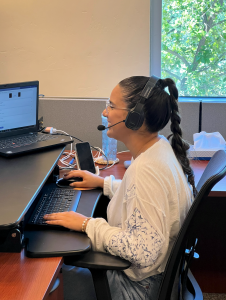When the ABR switched from in-person to remote exams, we endeavored not only to make the exams secure and reliable, but also to create a positive experience for candidates.
Staff from almost every department have played a role in achieving this goal. From IT designing user-friendly exam platforms, Exam Delivery developing schedules and emails, and Communications creating exam guides and videos to Special Projects Administrators conducting technical checks, and Certification Services (CSD) making phone calls, it has been a team effort to make sure candidates are prepared to have a successful exam day.
But regardless of how much information we send or training we provide, when exam day rolls around, some candidates may have issues. If they do, they can turn to the Exam Day Help Desk (EDHD).

The EDHD is a complex operation that, like the planning that went into remote exam development, involves a varied group of ABR staff. From the first remote exam, it has been in a perpetual state of evolution. Thanks to debriefings after each exam administration, the level of customer service offered to candidates has continually improved, and the system for keeping track of every candidate interaction has become more efficient.
“It’s been collaborative with everyone. Every time we’ve given an exam, in the after meeting, we discuss what were the problems and what can we do better. It is a meeting of all the minds involved,” said CSD Associate Director Tina Henson.
On exam day, the first level of support comes from certification managers and others who answer the phones. A candidate’s problem is often resolved in that first interaction.
“As time goes on, the CSD staff are becoming really technologically savvy,” said Exam Services Associate Director Lydia Warg. “They can troubleshoot a whole bunch of issues before we ever send a call to SysOps.”
If a candidate needs more in-depth technical support, a ticket is created on a board specifically designed for tracking issues during an exam. SysOps will then take over, helping candidates who are having difficulty getting into the exam at the start of the day or getting back in after an internet disconnection.
Other tickets are created for candidates who haven’t logged in at their assigned start time and those who need to have time added back to their exam and/or have questions unlocked. In addition to CSD and SysOps, Exam Delivery and Special Projects Administrators watch the board and pick up tickets as needed.
Candidates who call the EDHD are returned to their exam as quickly as possible and any lost exam time is replaced. In most cases, candidates with technical issues are helped and returned to their exam within five to 10 minutes. If a caller has a complicated issue, such as not being able to find a location with a reliable internet connection or needing more than 30 minutes added to their exam time, the call will be escalated to Tina, Lydia, or CSD Manager Kinsey SmithWright.
Kinsey oversees the “queue,” watching to see how many calls are coming in and making sure there are enough agents to answer them in a timely manner. This involves monitoring breaks, workflow, and TFS tickets, and calling more people to join the queue if help is needed. Kinsey also does a lot of the prep before exam day.
“Getting everyone organized ahead of time really cuts the stress,” Kinsey said. “We’ve definitely upped our customer service game from the very beginning in how we prepare the people who are going to be on the phones, the systems we use to provide timely service, and the types of service we can provide.”
We’ve also made improvements on other fronts that have decreased the number of candidate calls received per exam. In response to common issues, modifications have been made in the exam software, the information sent before exams, the Exam Readiness Check (for computer-based exams), and the navigator-led technical checks (for oral exams). These changes help head off problems before they start.
The Exam Readiness Check (ERC) provides a unique opportunity for candidates to familiarize themselves with the exam interface and navigation before their exam day. Completing the ERC is the best way for a candidate to fully understand the functionality of the exam interface as well as to test their computer setup to ensure that their microphone, camera, internet connection, and computer software are optimized for the exam.
The staff role in the exam process has changed greatly over the past 10 years. We no longer send a large group of people to Louisville for a week to conduct oral exams or staff exam centers in Tucson and Chicago. But the objective has stayed the same: provide secure, reliable exams while minimizing inconvenience and stress for candidates.
“I think it’s been amazing to watch what we’ve accomplished,” Tina said. “It’s been a privilege to be a part of it.”


